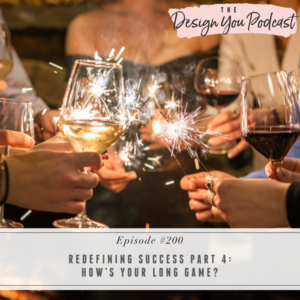
Cue the confetti, friends; today is HUGE! It’s the 200th episode of The Design You Podcast, and it’s also my 50th birthday! How incredible is it to hit both of those milestones on the same day? I am more successful right now than I might have ever dreamed of being in my lifetime, and I’m beyond excited to talk about this further with you this week.
There is so much amazingness that comes with aging. Whether it’s the wisdom, the courage to put yourself first, the stopping caring what other people think, or the knowing who you really are and what you want, it’s all so good. And this week, I’m sharing all of it with you.
Join me for the concluding episode of the Redefining Success series as I’m exploring the connection between aging and success and sharing what I’ve learned about the world as I turn 50. Find out exactly how I intend to use the next decade to create more success for this next stage of my life, and how you can redefine success moving forward no matter what stage of life you are currently in.
If you want help creating a business with thriving revenue streams so that you can design the life you really want, get on the waitlist for the next round of my Design You Coaching Program. Inside, you’ll get access to a whole new course where I share my complete design system with you. You’ll receive every template, tool, SOP, worksheet, downloadable, video, and more that I have created and used myself, and receive a complete step-by-step for how to run your full-service projects.





